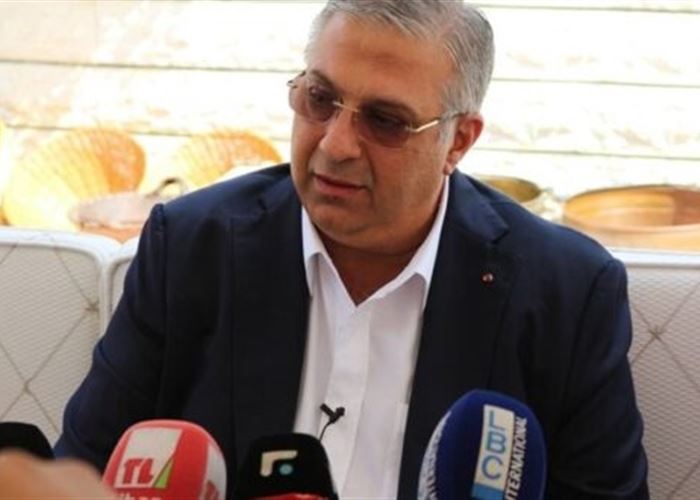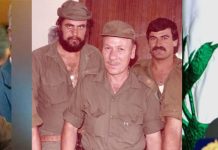The Possible Appointment of Nejad Fares as Lebanon’s Ambassador to Washington Raises Serious Questions
Elias Bejjani/May 24/2025
احتمال تعيين نجاد فارس سفيرًا للبنان في واشنطن أمر يطرح الكثير من الأسئلة
الياس بجاني/26 أيار 2025
نُشّر الأسبوع الماضي على مواقع التواصل خبراً مفاده وجود مداولات مكثفة على أعلى المستويات في لبنان لاختيار سفير جديد لدى الولايات المتحدة الأميركية، ويبدو أن الاسم المطروح بقوة هو السيد نجاد فارس، الركن البارز في مجموعة “أميريكان تاسك فورس فور ليبانون” (ATFL)، والذي قيل إنه يحظى بتأييد خاص من الرئيس جوزيف عون. وفيما يجري الحديث عن هذا التعيين على “نار حامية”، لا بد من التوقف عند جملة تساؤلات وملاحظات، ليس من باب التشكيك الشخصي، بل من منطلق المصلحة الوطنية العليا، والتمسك بالسيادة اللبنانية واستقلال القرار، والأهم التغيرات التي حدثت في المنطقة وما يواجهه لبنان من صعوبات وإشكالات لاستعادة سيادته والتخلص من احتلال حزب الله الإرهابي والإيراني.
السؤال الأول الذي يطرح نفسه: لماذا يتم اختيار اسم شخصية تحمل جنسية أميركية لتولي هذا المنصب، في وقت يوجد في لبنان، وفي أوساط الاغتراب اللبناني، المئات من الكفاءات الوطنية والسيادية المؤهلة، ممن لا يحتاجون للتخلي عن أي جنسية أجنبية للامتثال للقوانين اللبنانية وتولي المنصب؟ ألا يكشف ذلك عن ضيق أفق غير مبرر في خيارات الدولة عمومًا وخيارات الرئيس عون تحديدًا؟ ولماذا هذا الإصرار على أسماء مثيرة للجدل سياسيًا في توقيت حساس كالذي نمر به؟
إذا كانت فعلاً نية الرئيس جوزيف عون تبني ترشيح السيد نجاد فارس لهذا المنصب، فإن من واجب السيد فارس وقبل أي شيء، أن يعلن بوضوح ودون مواربة للرأي العام اللبناني وللرعاة الإقليميين الجاهدين لمساعدة لبنان للتخلص من الإحتلال الإيراني :
ما هو موقفه من قرارات مجلس الأمن الدولي ذات الصلة بلبنان، لا سيما:
القرار 1559 الذي ينص على تجريد الميليشيات من السلاح،
القرار 1701 الذي أنهى حرب تموز 2006 وكرّس سيادة الدولة،
القرار 1680 الذي دعا إلى ترسيم الحدود مع سوريا.
والأهم معرفة موقفه الواضح من كل بنود اتفاقية وقف اطلاق الذي صدر عقب توقف الحرب التي كان شنها حزب الله على دولة إسرائيل بقرار إيراني وليس لبناني مساندة لحرب حماس الإرهابية.
ونسأل، هل يتوافق موقف السيد فارس مع مضمون هذه القرارات؟ أم أنه، مثل الرئيس جوزيف عون، يفضل نظرية “الحوار مع حزب الله” وهي النظرية التي أثبتت فشلها الذريع على مدى عقدين من الزمن؟ فالحزب المسلح لم يتخلّ يومًا عن سلاحه، ورفض كافة المبادرات الحوارية، ونقض كل تفاهم وطني، وكلما جلس على طاولة حوار، عاد بعدها إلى فرض شروطه على اللبنانيين بقوة السلاح.
إن المسؤولية الوطنية والأخلاقية تفرض على السيد فارس، إن كانت لديه نية فعلية في تولي هذا المنصب، أن يصدر بيانًا علنياً وصريحًا يوضح فيه مواقفه من كل ما يتعلق بـ”حزب الله”، ومن القرارات الدولية المذكورة أعلاه، ويؤكد التزامه الكامل بها، وإيمانه بضرورة حصرية السلاح بيد الدولة اللبنانية فقط، لا غير.
يبقى إن خيار تعيين السيد نجاد فارس، في حال صحّت الأنباء، هو برأي كثيرين داخل لبنان وفي بلاد الإنتشار هو خيار غير موفق إطلاقاً، لا بل يطرح الكثير الأسئلة في توقيته ودلالاته.
في الخلاصة، إن لبنان بحاجة اليوم إلى دبلوماسيين يحمون سيادته وتاريخهم سيادي واستقلالي، ويعملون على التخلص من احتلال حزب الله، ويواجهون المشروع الإيراني، دون ذرائع، ولهذا لقد آن الأوان لإختيار سفراء فعلاً يمثلون لبنان الساعي إلى السلام والتحرير والتخلص من احتلال حزب الله ومن كل ثقافات العنف والعداء..
*الكاتب ناشط لبناني اغترابي
رابط موقع الكاتب الألكتروني
https://eliasbejjaninews.com
*عنوان الكاتب الألكتروني
phoenicia@hotmail.com
The Possible Appointment of Nejad Fares as Lebanon’s Ambassador to Washington Raises Serious Questions
Elias Bejjani/May 26/2025
Last week, social media platforms circulated news about intensive deliberations taking place at the highest levels in Lebanon to choose a new ambassador to the United States. The leading candidate appears to be Mr. Nejad Fares, a prominent figure in the “American Task Force for Lebanon” (ATFL), who is reportedly receiving special backing from president Joseph Aoun. As discussions around this appointment intensify, it is essential to pause and raise a number of questions and observations—not out of personal suspicion, but from a standpoint rooted in Lebanon’s national interest, its sovereignty, and the ongoing regional shifts and domestic challenges Lebanon faces in its struggle to reclaim its independence and liberate itself from the Iranian-Hezbollah occupation.
The first and most obvious question is this, why is a dual U.S. citizen being considered for this crucial post, when Lebanon and the Lebanese diaspora are home to hundreds of highly qualified, sovereign-minded individuals who meet all legal requirements and do not need to renounce any foreign citizenship to comply with Lebanese laws?
Doesn’t this indicate a troubling narrowness in the selection process—especially in president’s Aoun’s choices?
And why, during such a critical and sensitive period, the focus is on nominating figures who spark political controversy and raise many questions?
If it is indeed true that president Aoun is pushing for Mr. Nejad Fares to be appointed to this position, then it is Mr. Fares’s duty—first and foremost—to clearly and publicly declare to the Lebanese people, and to the regional and international actors striving to help Lebanon break free from Iranian occupation:
Where does he stand on the key United Nations Security Council resolutions related to Lebanon, particularly:
Resolution 1559, which calls for the disarmament of all militias,
Resolution 1701, which ended the 2006 war and reasserted the sovereignty of the Lebanese state,
Resolution 1680, which called for the demarcation of borders with Syria.
And most importantly, his clear stance on all the provisions of the ceasefire agreement issued following the end of the war that Hezbollah launched against the State of Israel—on orders from Iran, not Lebanon—in support of Hamas’s terrorist war.
We must ask: Does Mr. Fares support the full implementation of these resolutions? Or does he, like president Joseph Aoun, adhere to the failed notion of “dialogue with Hezbollah”—a theory that has proven disastrous over the past two decades? Hezbollah has never once abandoned its weapons. It has rejected every call for dialogue, broken every national accord, and each time it sat at the dialogue table, it later returned to impose its terms on the Lebanese people by force of arms.
The national and moral responsibility falls on Mr. Fares—if he truly intends to take on this diplomatic post—to issue an unambiguous and public statement detailing his position on Hezbollah and the aforementioned international resolutions. He must express his full commitment to these resolutions and affirm his belief that only the Lebanese state should possess arms—no one else.
Ultimately, if the reports of Mr. Nejad Fares’s nomination are accurate, then many inside Lebanon and within the diaspora view this choice as highly unfortunate, one that raises serious doubts about its timing and implications.
In conclusion, Lebanon today needs ambassadors with a sovereign and independent track record—diplomats committed to confronting the Iranian project and ending Hezbollah’s occupation. It is time to appoint ambassadors who genuinely represent a Lebanon that seeks peace, liberation, and an end to Hezbollah’s grip and to all forms of violence and hostility.


















